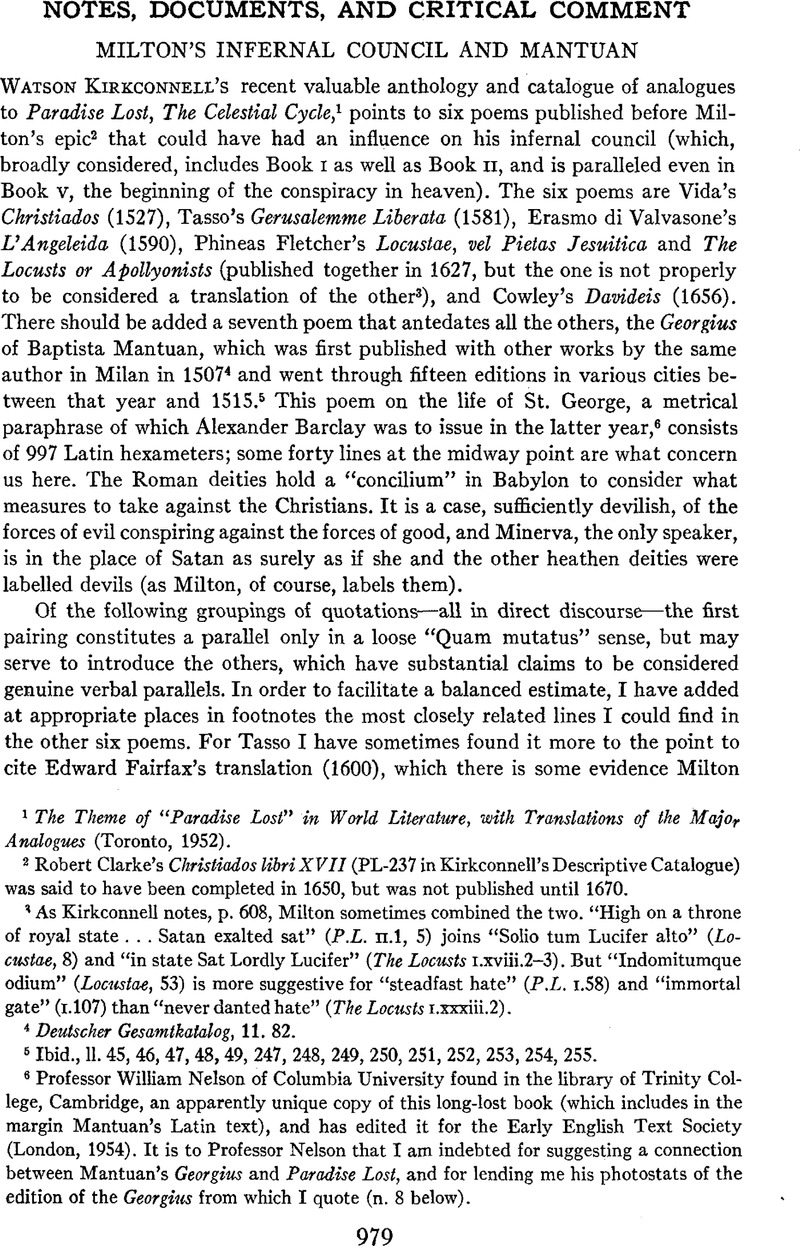No CrossRef data available.
Article contents
Milton's Infernal Council and Mantuan
Published online by Cambridge University Press: 02 December 2020
Abstract

- Type
- Notes, Documents, and Critical Comment
- Information
- Copyright
- Copyright © Modern Language Association of America, 1954
References
1 The Theme of “Paradise Lost” in World Literature, with Translations of the Major Analogues (Toronto, 1952).
2 Robert Clarke's Christiados libri XVII (PL-237 in Kirkconnell's Descriptive Catalogue) was said to have been completed in 1650, but was not published until 1670.
3 As Kirkconnell notes, p. 608, Milton sometimes combined the two. “High on a throne of royal state … Satan exalted sat” (P.L. ii.1, 5) joins “Solio tum Lucifer alto” (Locustae, 8) and “in state Sat Lordly Lucifer” (The Locusts i.xviii.2-3). But “Indomitumque odium” (Locustae, 53) is more suggestive for “steadfast hate” (P.L. i.58) and “immortal gate” (i.l07) than “never danted hate” (The Locusts i.xxxiii.2).
4 Deutscher Gesamtkatalog, 11. 82.
5 Ibid., ll. 45, 46, 47, 48, 49, 247, 248, 249, 250, 251, 252, 253, 254, 255.
6 Professor William Nelson of Columbia University found in the library of Trinity College, Cambridge, an apparently unique copy of this long-lost book (which includes in the margin Mantuan's Latin text), and has edited it for the Early English Text Society (London, 1954). It is to Professor Nelson that I am indebted for suggesting a connection between Mantuan's Georgius and Paradise Lost, and for lending me his photostats of the edition of the Georgius from which I quote (n. 8 below).
7 Cf. Ewald Pommrich, Miltons Verhältnis zu Torquato Tasso (Halle, 1902), p. 31, n. 1.
8 Georgius Baptistae Mantuani Carmelitae Theologi et Poetae clarissimi, ab Ascensio familiariter explanatus (Strassburg, 1510), fol. xxv. The subsequent quotations follow consecutively xxir-xxiiv. I have expanded contractions and righted one turned letter. With the particular passage cf. Vida, Christiados i, 126-127: “Sollicitus partes animum versabat in omnes, / Siqua forte potis regno avertere cladem”; and Fletcher, Locustae, 47-48: “Quo tanti cecidere animi? Quo pristina virtus / Cessit … ?”
9 Cf. Cowley, Davideis, Book i, ,juxta n. 14:
10 Tasso, Jerusalem Delivered iv.ix.5-6: “Our former glory still remember it, / Our bold attempts and war we once did make”; and Fletcher, continued from note 8 above: “in aeternam qua mecum irrumpere lucem / Tentastis, trepidumque armis perfringere coelum?”
11 Tasso, iv.x.1-4.
Tasso's line, “N'ha qui rinchiusi in quest' abisso oscuro,” is to be compared with Valvasone's L'Angeleida i.lxxiii.6, “L'oscuro abisso della cava inferna,” but closest to Milton is line 6 of Valvasone's next stanza, “Da stato eccelso a misere ruine.”
12 Fletcher, The Locusts i.xxxviii.8: “The fires, and tortures we are whelmed in.”
13 Ibid., xxxiii.5: “treble repay our harmes.”
14 Fletcher, Locustae, 35 ff.:
15 Fletcher, The Locusts i.xxx.4-8, and xxxi.7-9:
16 A common recollection in the poems, e.g., Vida, i.167: “Tartarei proceres, cœlo gens orta sereno,” and Tasso, iv.ix.1-2: “Tartarei Numi, di seder più degni / Là sovra il Sole, ond'è l'origin vostra.”
17 “Servile yoke,” Paradise Regained iv.102; a common reference in Milton's English and Latin (e.g., “jugum illud servile,” Columbia Milton, vii, 216) prose (see the Patterson Index to the Columbia Milton, s.v. “Yoke”).
18 Fletcher, The Locusts ii.xviii.3: “See here a heart, which scornes that gentle yoke.”
19 Valvasone, ii.xlii.3-4: “Vostra natura, o valorose genti, / O frati miei, d'ogni bassezza è sgombra.”
20 Valvasone, ii.xliv:
21 Tasso, iv.xvi.1 ff.: “Ma perchè più v'indugio? Itene, o miei / Fidi consorti, o mia potenza, e forze, / Ite veloci.” Valvasone, iii.xvi.5-8:
22 Fletcher, Locustae, 97: “Consulite, imperioque alacres succurrite lapso.”
23 Anglo-Saxon Poetry, tr. R. K. Gordon (Everyman's Library), p. 111.
24 “Two Notes on Milton,” MLR, ii (1907), 121-124. “Apologus de Rustico et Hero” is supposed to derive ultimately from Mantuan. See Walter MacKellar's edition of The Latin Poems of John Milton (New Haven, 1930), p. 39.
25 Lib. i: “Il miserabile re, il cui regno Acheronte circonda, … convocati nel suo cospetto gl'infernali ministri, disse: compagni, voi sapete che Giove non dovutamente degli alti regni i quali possede ci privò, e diecci questa strema parte sopra il centro dell'universo a possedere; e in dispetto di noi creo nuova progenia, la quale i nostri luoghi riempiesse: noi ingegnosamente gli sottraemmo, sicchè noi volgemmo i loro passi alle nostre case. .. .” Opere Volgari (Florence, 1829), vii, 18-19.




